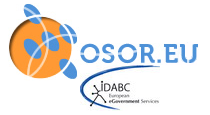Back in 2011 y wrote a post in this blog which dealed with Pherecyde's Cloth myth and its relation to map making and GI managing [1]. The starting point of my thoughts were Ray Kurzweil's [2] predictions about the capacity of real things (i.e. stones) to store information. That was kind of a seminal approach to what is now known as the Internet of Things (IOT), but taken even far beyond.
I remembered these things when I begun writing my previous entry, what took me to also remember another question related to Kurzweil's words: the importance of treating science areas as Information Systems. He explictly mentions medicine and biotechnology, but a friend of mine, Dr Lois F. R. Vázquez, has another good view on this issue as he teaches Computational Chemestry at University of A Coruña. Both of them mention the terrible impulse that all of these disciplines suffered as soon as they begun being modelled as information systems.
Given that I was, by then, developing my final work for TechniCity class at Coursera [3], I begun considering whether what I was proposing by means of the meta-framework for i-Coruña Intelligent City project wasn't actually but thinking of the city as an information system. And the more I think of it, the more I am sure that that's, precisely, the answer to build more intelligent cities by using information technologies.
Thinking that implementing IT solutions to solve given, not interconnected urban problems makes a city to be smarter is rather simplistic. By following that track, the only thing that you'll be obtaining is a set of more or less smart applications, but you will never get your target city to become smarter, and you will be far away of getting it to be more intelligent.
As the Spanish National Plan on Intelligent Cities [4] stablishes, you will only achieve that your city becomes more intelligent if you think of it in a holistic way. And that's exactly what thinking of it as an Information System produces: a holistic view on the city, with ITs being the tools to manage that view.
[1]: http://giseiel.blogspot.com.es/2011/06/pherecydes-cloth-ii-ecloth.html
[2]: http://en.wikipedia.org/wiki/Ray_Kurzweil
[3]: http://class.coursera.org/techcity-003
[4]: http://www.agendadigital.gob.es/planes-actuaciones/Paginas/plan-nacional-ciudades-inteligentes.aspx
Jornadas del IACS Data Sharing
5 hours ago





